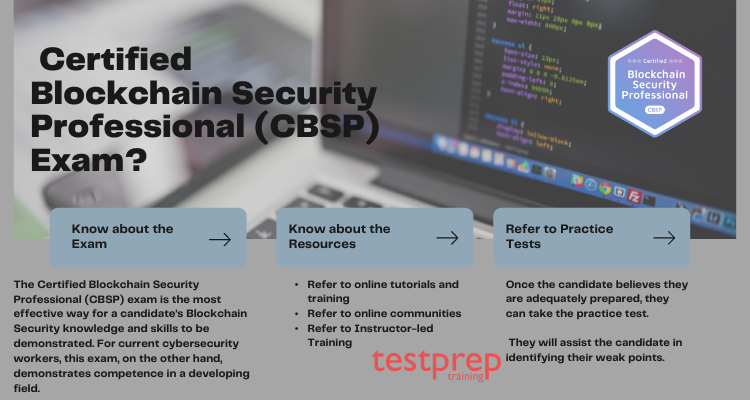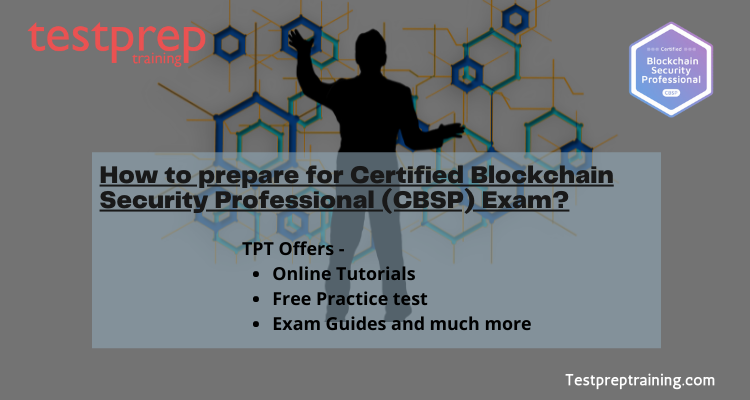The Certified Blockchain Security Professional (CBSP) Exam is a certification exam that tests an individual’s knowledge and skills in blockchain security. It is designed to validate an individual’s expertise in securing blockchain systems and networks. The exam covers a range of topics, including blockchain basics, cryptography, security protocols, and threat mitigation techniques. Obtaining the CBSP certification is important for several reasons:
- Enhance credibility: The certification is recognized as a validation of an individual’s knowledge and expertise in blockchain security. Having this certification on a resume or LinkedIn profile can enhance an individual’s credibility and demonstrate their commitment to continuing education and professional development.
- Career advancement: Many employers prefer to hire professionals who have obtained industry certifications, such as the CBSP certification. It can help individuals stand out from the competition and potentially lead to career advancement opportunities.
- Skill development: Preparing for the CBSP certification exam requires a significant amount of studying and hands-on practice. This can help individuals develop and enhance their skills in blockchain security, cryptography, and threat mitigation techniques.
- Access to resources: As part of the certification program, individuals have access to a range of resources and support from the certification body, including training courses, certification study materials, and an online community of professionals. This can help individuals stay up-to-date on the latest technologies, best practices, and trends in blockchain security.
About the Certified Blockchain Security Professional (CBSP) exam
The Certified Blockchain Security Professional (CBSP) exam is the most effective way for a candidate’s Blockchain Security knowledge and skills to be demonstrated. For current cybersecurity workers, this exam, on the other hand, demonstrates competence in a developing field. Furthermore, the candidate will be part of a group of Blockchain thought leaders. This exam will also validate candidates’ knowledge in the following areas:
- Detecting and mitigating security threats and attacks on a blockchain network
- Methods of blockchain security
- The best practices
- Risk reduction
Target Audience:
The CBSP Exam is best suitable for:
- Blockchain Architects
- Blockchain Developers
- Application Developers
- Blockchain System Administrators
- Network Security Architects
- Cyber Security Experts
- IT Professionals w/ cybersecurity experience
Let us now have a look at the exam details –
Exam Specifics
- The exam for the Certified Blockchain Security Professional (CBSP) includes 70 multiple-choice questions.
- The exam, which is a performance-based evaluation of Blockchain Security skills and knowledge, will take 90 minutes to complete.
- However, in this case, performance-based testing means that candidates must respond to questions that reflect what they must do on the job.
- Candidates must achieve a minimum of 70% to pass the exam. This exam is only available in English and costs $300 USD. This exam voucher is valid for one year from the date of purchase.

Let us now jump to the course outline –
Course Structure
The Certified Blockchain Security Professional exam includes the following topics:
Blockchain Basics
- Introduction to Blockchain
- Public and Private Blockchains
- Blockchain Forks
Blockchain Consensus Mechanism
- Fundamentals of Consensus Algorithm
- Blockchain Consensus Security
- Other Blockchain Consensus
Cybersecurity Threats and Incidents on Blockchain Network
Different Security Mechanisms
- Basic Security Mechanism
- Advanced Cryptographic Encryption
- Other Security Mechanisms
Blockchain Risk Assessments
- Blockchain Risk Considerations
- The Security Ecosystem
- Blockchain Architectural Design
Two-Factor Authentication with Blockchain
- What is 2FA?
- Blockchain for 2FA
Vulnerabilities & Attacks
- Client’s Vulnerabilities & Attacks
- Consensus Mechanisms Vulnerabilities & Attacks
- Mining Pool Vulnerabilities & Attacks
- Network Vulnerabilities & Attacks
- Smart Contract Vulnerabilities & Attacks
Alternative DLT Architecture
Let us now try to evaluate the worth of taking this exam!
Why take this exam?
Blockchain is consistently one of the highest-paying programming fields, with salaried developers earning between $150,000 and $175,000 per year on average. While a variety of factors influence pay, even inexperienced blockchain developers can command a high salary. Blockchain is one of the highest-paying programming fields, which means that blockchain developers frequently out-earn their peers who know other programming languages.
Any amount of blockchain knowledge is beneficial. Beginning blockchain developers typically earn six figures. While American companies pay the most, these positions are frequently available globally because blockchain development is very remote-friendly.
Let us now look at some resources that will help you ace the exam in one go!
1. Blockchain Exam Study Guide
The Blockchain offers an exam preparation guide for the Certified Blockchain Security Professional (CBSP) exam, which covers exam objectives as well as a detailed overview of all Blockchain security issues, such as threats, risk mitigation, security node integrity, confidentiality, best security practices, high-level Blockchain security, and so on. This Certified Blockchain Security Professional official exam study guide, on the other hand, includes twelve Chapters and practice questions. This guide will be useful to candidates as they prepare for the Certified Blockchain Security Professional exam.
2. Study materials and resources
To prepare for the CBSP exam, individuals should obtain study materials and resources that cover the exam topics. Some resources to consider include:
- The official CBSP Certification Guide: This guide provides an overview of the exam topics, sample questions, and study resources.
- Online training courses: Various online courses are available to help individuals prepare for the CBSP exam. These courses cover the exam topics in-depth and often provide hands-on experience.
- Practice exams and quizzes: Practice exams and quizzes can help individuals assess their knowledge and identify areas that require further study.
- Industry publications and research papers: Reading industry publications and research papers can help individuals stay up-to-date on the latest trends and best practices in blockchain security.
3. Understanding Blockchain Security
To pass the CBSP exam, individuals should have a solid understanding of blockchain security. This includes understanding the basics of blockchain technology, as well as how to secure and protect blockchain networks and systems. Some areas to focus on include:
- Blockchain architecture and components
- Cryptography and encryption
- Smart contract security
- Consensus protocols and network security
- Threats and vulnerabilities in blockchain systems
- Risk assessment and mitigation techniques
4. Hands-on experience with Blockchain Security
In addition to studying the exam topics, individuals should also gain hands-on experience with blockchain security. This can include:
- Building and deploying blockchain networks and systems
- Identifying and mitigating security threats and vulnerabilities in blockchain systems
- Implementing security protocols and standards
- Developing and testing smart contracts
- Conducting risk assessments and developing risk management plans
Hands-on experience can help individuals apply their knowledge in real-world scenarios and gain practical experience that can be valuable on the exam and in their careers.
5. Instructor-led Training
Blockchain provides candidates with instructor-led training through labs, allowing them to gain real-world skills in a comfortable, ready-to-learn environment. However, these global training locations are strategically designed to provide our students with learning opportunities in many major cities around the world. Blockchain subject matter experts, superior content, and relevant hands-on labs will be provided to candidates.
It does, however, provide Virtual WebEx Instructor-led. This is a hybrid of virtual classroom and live training that includes premium learning technologies, industry-leading instructors, content, exercises, and peer collaboration to ensure you have the best professional development experience possible.
6. Self-Paced Blockchain Training
Blockchain offers self-paced training, including the Security for Blockchain Professionals course. However, candidates in this position must demonstrate knowledge of:
Security threats and attacks on a Blockchain network are identified and compared.
Best practices for blockchain security, risk mitigation, and more.
Analyzing the security risks of the Blockchain network.
Using appropriate Blockchain data protection techniques.
This is essentially an On-Demand video class training that covers Blockchain Security concepts for those looking for a comprehensive overview of Blockchain security issues such as threats, risk mitigation, confidentiality, best security practices, Blockchain security, and so on. This class, on the other hand, is intended for those who prefer to develop the skills they require on their own time and at their own pace.
7. Online Forum and Groups
Participating in study groups will be beneficial during exam preparation. These groups will keep you in touch with others who are on the same path as you. You can also start a discussion about any exam-related issue or question here. If you do this, you will receive the best possible response to your query.
8. Practice Tests
This is a critical component that will assist you in better preparing for the exam. That is to say, Certified Blockchain Security Professional exam practice tests are important because they allow you to assess your weak and strong points. However, by practicing, you will be able to improve your answering skills and save a significant amount of time. Furthermore, the best time to begin doing practice tests is after you have completed one full topic, as this will serve as a revision component for you. So, make certain to locate the best practice sources.
Exam Tips
- Time management: Time management is crucial for passing the CBSP exam. The exam consists of multiple-choice questions, and candidates have a limited amount of time to complete it. Therefore, it is important to manage time wisely and allocate enough time for each question.
- Reading the questions carefully: It is important to read the questions carefully and understand what is being asked before answering. Candidates should take their time to ensure they understand the question and avoid making assumptions.
- Eliminating incorrect answer choices: Candidates should eliminate incorrect answer choices to narrow down the possible correct answers. This strategy can increase the chances of selecting the correct answer and save time by eliminating obviously wrong answers.
- Guessing when unsure: If a candidate is unsure about the correct answer, it is better to make an educated guess rather than leaving the question unanswered. Candidates should eliminate obviously incorrect answers and select the best possible answer based on their knowledge.
- Reviewing your answers: It is recommended to review all answers before submitting the exam to ensure that all questions have been answered and there are no mistakes. Candidates should also review their answers to ensure they have not misread the questions or made any careless mistakes.
Final Words
In conclusion, obtaining the Certified Blockchain Security Professional (CBSP) certification can be a great asset for professionals looking to advance their careers in the blockchain industry. However, passing the CBSP exam requires extensive knowledge and understanding of blockchain security, as well as practical experience with blockchain technologies.
To prepare for the CBSP exam, candidates should utilize a variety of study materials and resources, including textbooks, online courses, practice exams, and hands-on experience with blockchain technologies. It is also important to develop effective test-taking strategies, such as time management, careful reading of questions, and eliminating incorrect answer choices.
Overall, the CBSP certification can help professionals demonstrate their expertise and commitment to blockchain security, which can open up new career opportunities and enhance their professional reputation. As the blockchain industry continues to grow and evolve, the demand for skilled blockchain security professionals is likely to increase, making the CBSP certification a valuable investment for those seeking to advance their careers in this exciting field.


